
|
With so many tools and strategies available to small businesses, it can be challenging to determine which ones are essential. A business without the right tools is like a car without an engine — it won't get anywhere. Similarly, knowing which roles team members should play could mean success or failure.
Skynova recently surveyed 1,000 small-business owners who successfully discovered the strategies and tools needed to build and grow their companies. Keep reading to learn more about our survey results, including information about the tools necessary for building a "small empire."
Small businesses don't always have access to the same resources as larger companies. This lack of resources can make it difficult for them to stay afloat. With about 20% of small businesses failing within their first year of operation, and only a third of them surviving after 10 years, it's imperative to understand and mitigate common pain points.
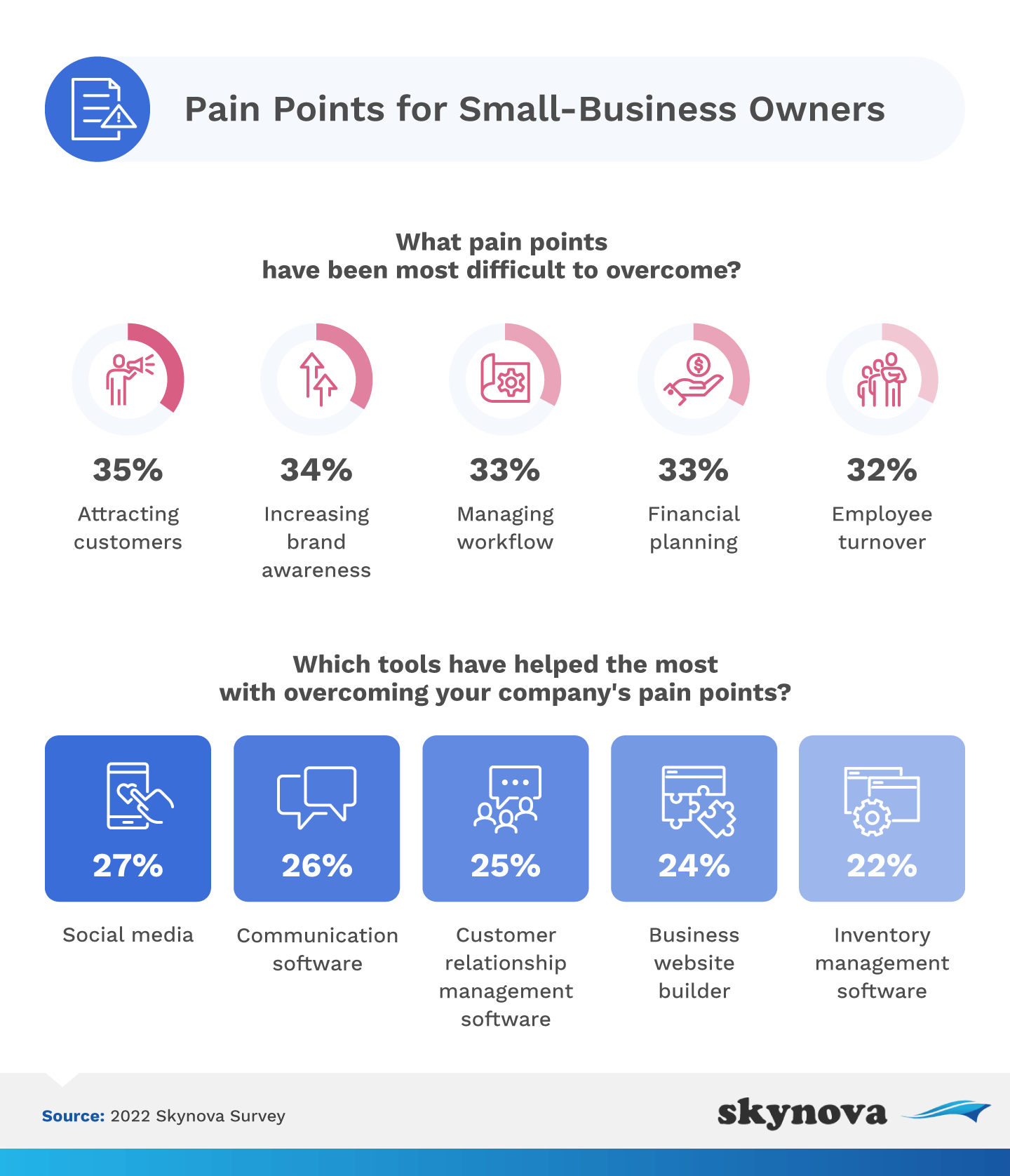
To identify small-business owners' biggest issues, we asked respondents to rank their pain points from most to least severe. The top three responses were attracting customers (35%), increasing brand awareness (34%), and managing workflow (33%).
Small-business owners also face the challenge of managing their workflow. Having the team is one thing, but getting everyone on the same page is another. Many entrepreneurs need help allocating tasks and managing team collaboration. Fortunately, small-business owners now have access to various tools to help them manage their businesses more efficiently, like social media platforms (27%) and business software programs. These methods help organizers stay connected with their team, customers, and future prospects. Plus, integrating these tools with other business functions can improve efficiency and accuracy.
Having the right tools for the job makes a substantial difference in running a small business. However, choosing these tools can be challenging since you must find software with features that fit the nature of your work and serve the needs of your business. Next, we'll look at all the tools needed for small business success and how the right combination can be key to unlocking an enterprise's full potential.
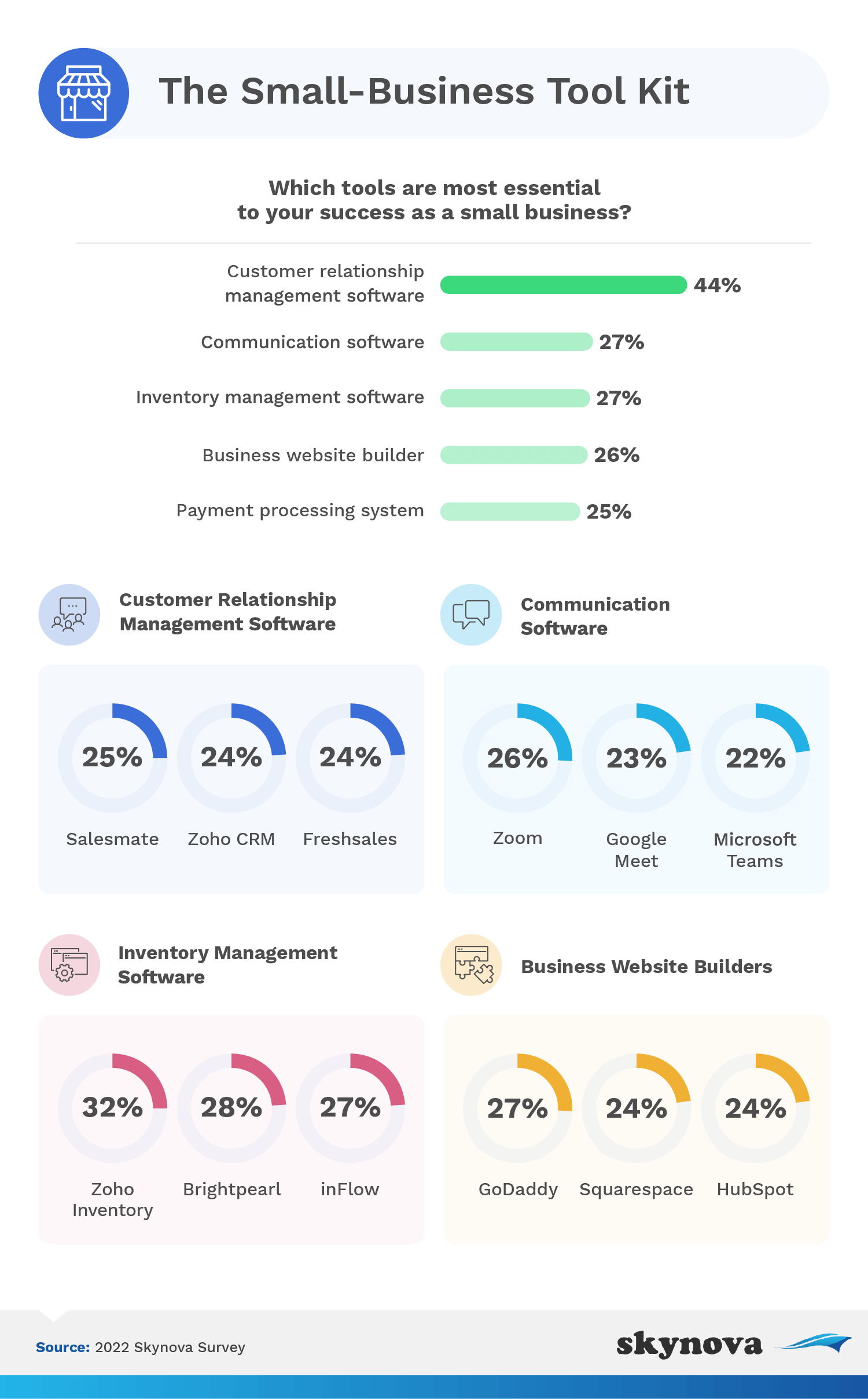
Our study shows that 44% of small-business owners view a quality customer relationship management (CRM) tool as pivotal to the success of their enterprise. CRM software provides a comprehensive suite of services that enable businesses to easily manage contacts, customer interactions, and analytics all in one place.
Furthermore, business software can lead to more revenue. We discovered that small-business owners who spend $600 monthly on their business software earn, on average, $4,000 more in revenue than those who only invest $400 each month. And what's most exciting is that just over 50% of small businesses made a profit within a year of investing in tools for their company.
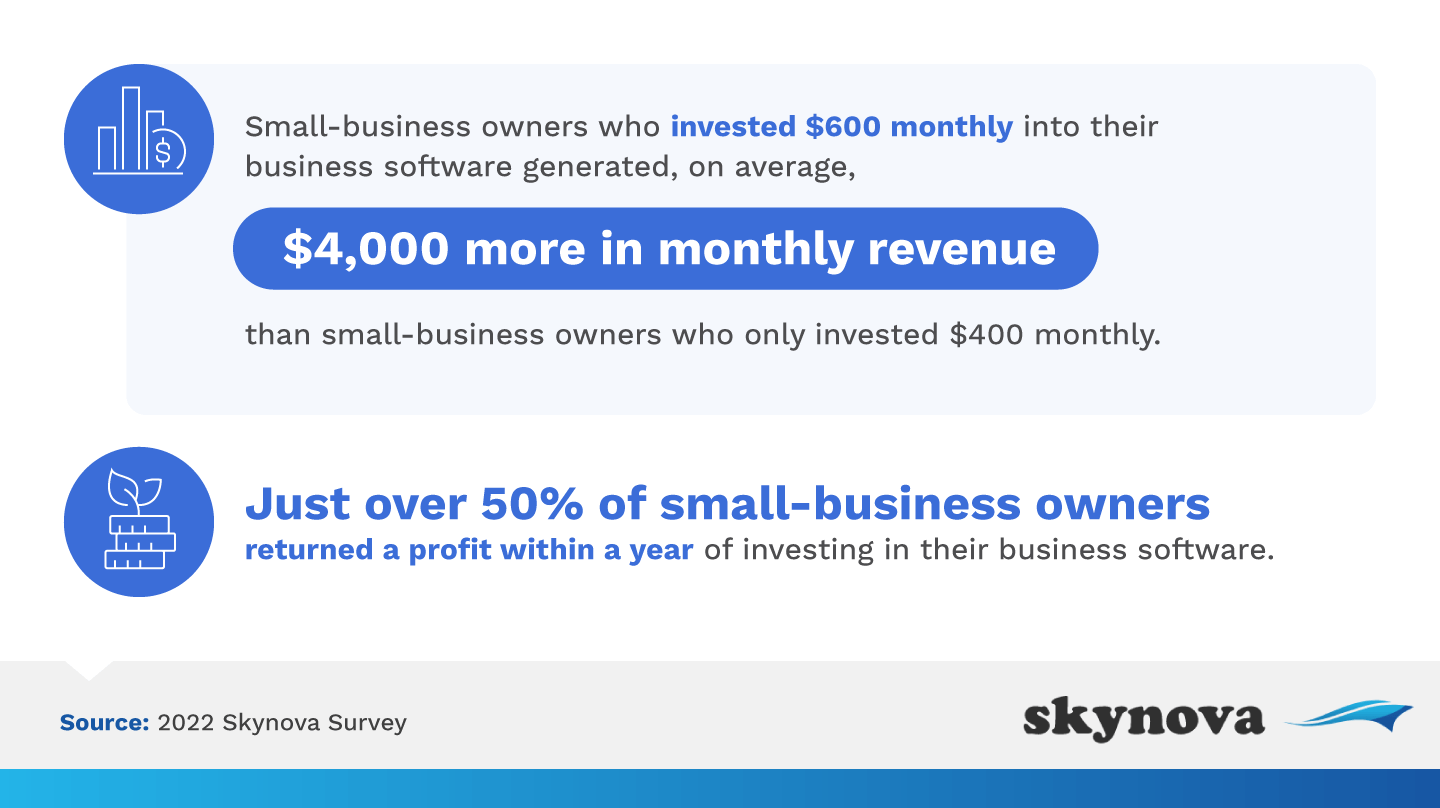
Our study also focused on what tools a group of small-business owners in the Gen Z bracket use. Given that Gen Z entrepreneurs grew up during the age of the internet, it's no surprise that 30% of them cite social media as the most important tool for their business success. They credited Instagram, specifically, as the most essential platform for growing their business.
With 4.59 billion active social media users worldwide, companies can leverage social media to solve many of the pain points discussed earlier. Some small-business owners only see social media as a way to socialize, but others understand they can use it to attract new customers, improve name recognition, and advertise.
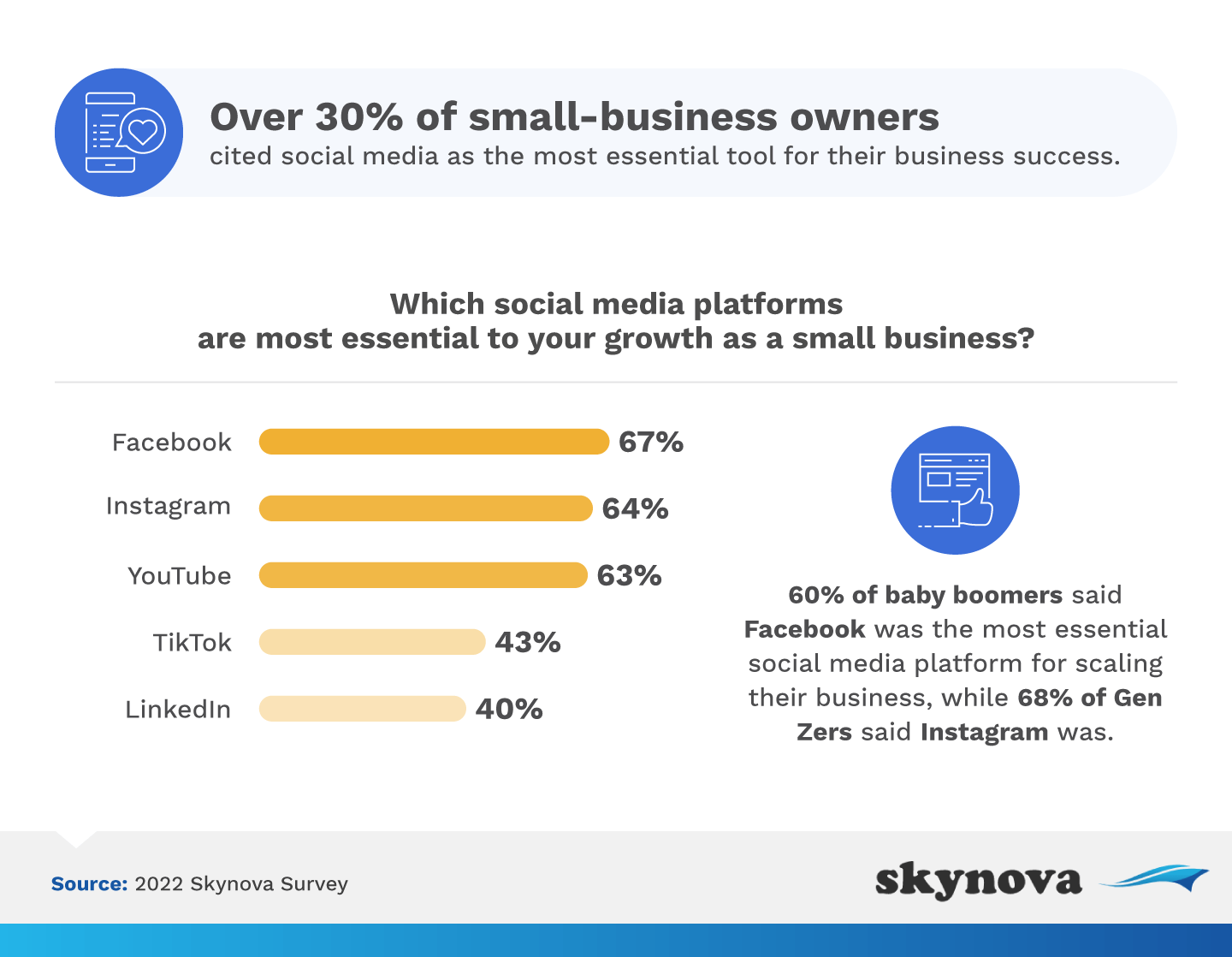
Gen Zers aren't the only group taking advantage of the social media tools available today; 60% of baby boomers said that Facebook is their primary social media method when building customer connections. It's evident that no matter what generation you're born into, it's critical to be strategic when choosing the platform you use if you want to maintain online relationships.
A successful business is always a collaborative job. If you want your company to reach its potential, it needs to be able to grow, and that takes the right team. For this last part, we asked small-business owners what they believed were the most important roles of a successful small business.
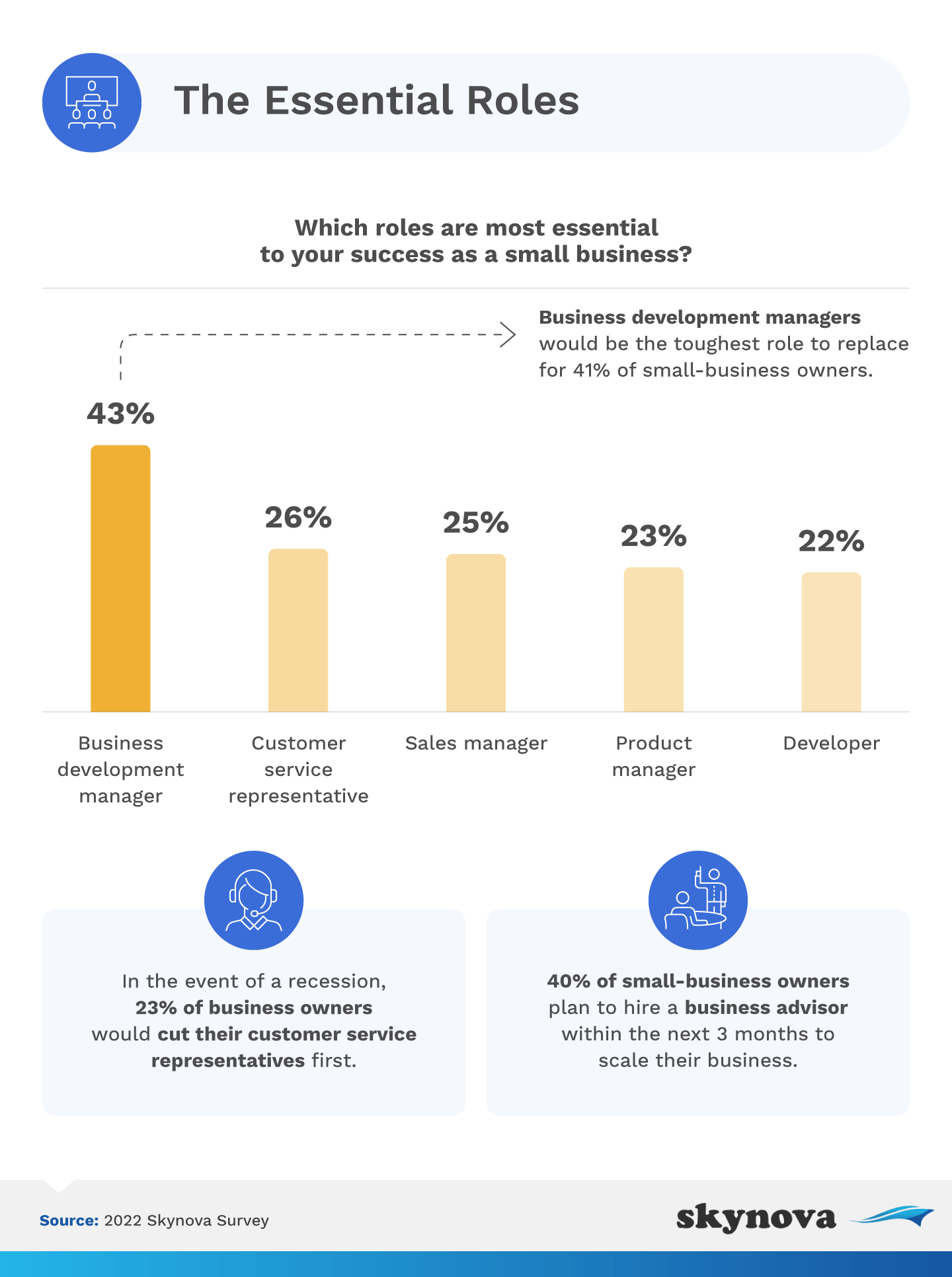
In a business, there are many roles people can fill, but identifying the most vital ones can help you get your company running quickly and efficiently. Our study found that 43% of small businesses believe their business development manager is essential, making this role one of the most crucial in a small business. This position is also the most difficult to replace, as 41% of small-business owners said so.
Customer service representatives also play an important role in businesses, but unfortunately, they are also some of the first employees let go during tough economic times. Almost a quarter of entrepreneurs said that cutting customer service representatives would be one of their first actions if they were struggling financially. This could be because some view customer service representatives as an expendable role, or it could be that entrepreneurs would rather focus on keeping their core team intact.
As for new hires, 40% of respondents said they plan to hire a business advisor in the next three months. This suggests that small businesses are increasingly turning to outside resources for growth advice and assistance, with the ultimate goal of increasing profits.
From our survey, we can conclude that although many factors affect a small business's success, investing in the right tools and team members is essential. Small businesses may consider which tools will be the most beneficial for their business, such as software and social media.
Additionally, ensuring that their team is well-equipped to handle the challenges of a fast-paced business environment is critical. Small businesses can achieve growth and profit with the right tools and team members, even in tough economic times. If small-business owners focus on strategizing and investing in their teams, they will be better prepared to succeed!
Skynova Inc. is a leading online software provider for small businesses, offering valuable solutions such as an invoice template. Skynova Inc. is committed to helping businesses by providing them with the tools and resources they need to succeed.
We surveyed 1,000 successful small-business owners. The mean age of respondents was 40 years old. Among them, 57% were male, and 43% were female. Respondents comprised the following generational breakdown: 21% Gen Z, 29% millennials, 25% Gen X, and 25% baby boomers.
If you believe that the findings from this small-business owner survey would be of use to anyone in your audience, feel free to share it with them. Just ensure that your reasons are noncommercial and that you credit this page by including a link back to it.